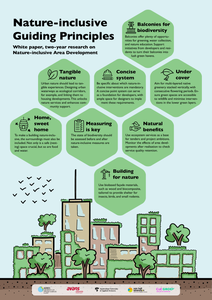This is a case study which discusses the journey of a successful Ethiopian dairy entrepreneur. It turned out that the inclusiveness of the small holder farmer into the chain with fair incentive sharing mechainsms and guarenteed market access made her chain more efficient, reliable and profitable.
DOCUMENT

Applied psychology in education can stand for social connection, for a world that is getting richer, in which more colours are accepted. Also, a world in which neurodiversity plays a key role. A world in which educational programs start from an in-depth understanding of target groups, guaranteeing that users are involved as co-designers in the development of new methods that restore and support inclusiveness.
MULTIFILE

In the book, 40 experts speak, who explain in clear language what AI is, and what questions, challenges and opportunities the technology brings.
DOCUMENT

DOCUMENT
This paper examines how a serious game approach could support a participatory planning process by bringing stakeholders together to discuss interventions that assist the development of sustainable urban tourism. A serious policy game was designed and played in six European cities by a total of 73 participants, reflecting a diverse array of tourism stakeholders. By observing in-game experiences, a pre- and post -game survey and short interviews six months after playing the game, the process and impact of the game was investigated. While it proved difficult to evaluate the value of a serious game approach, results demonstrate that enacting real-life policymaking in a serious game setting can enable stakeholders to come together, and become more aware of the issues and complexities involved with urban tourism planning. This suggests a serious game can be used to stimulate the uptake of academic insights in a playful manner. However, it should be remembered that a game is a tool and does not, in itself, lead to inclusive participatory policymaking and more sustainable urban tourism planning. Consequently, care needs to be taken to ensure inclusiveness and prevent marginalization or disempowerment both within game-design and the political formation of a wider participatory planning approach.
MULTIFILE
Societal resilience is an emerging paradigm. It refers to responses and strategies at the level of individuals, groups, organizations, and societies that are dealing with complex societal problems. At the same time, these responses contribute to innovative solutions that make society more resilient to current and future challenges. Societal resilience is, however, conceptually relatively undefined. This ambiguity is generally seen as problematic for scholarly work. In this chapter, the authors show that societal resilience is an important social concept because of its openness. To study resilience requires research methodologies that engage many actual stakeholders. Collaborating with societal stakeholders allows not only for co-generating knowledge of local relevance, but also stimulating a comprehensive and critical research approach. Therefore, the current openness of societal resilience does not constitute an undesirable theory gap. It enables the possibility of having plural perspectives based on the complex realities on the ground.
DOCUMENT

This paper examines how a serious game approach could support a participatory planning process by bringing stakeholders together to discuss interventions that assist the development of sustainable urban tourism. A serious policy game was designed and played in six European cities by a total of 73 participants, reflecting a diverse array of tourism stakeholders. By observing in-game experiences, a pre- and post -game survey and short interviews six months after playing the game, the process and impact of the game was investigated. While it proved difficult to evaluate the value of a serious game approach, results demonstrate that enacting real-life policymaking in a serious game setting can enable stakeholders to come together, and become more aware of the issues and complexities involved with urban tourism planning. This suggests a serious game can be used to stimulate the uptake of academic insights in a playful manner. However, it should be remembered that a game is a tool and does not, in itself, lead to inclusive participatory policymaking and more sustainable urban tourism planning. Consequently, care needs to be taken to ensure inclusiveness and prevent marginalization or disempowerment both within game-design and the political formation of a wider participatory planning approach.
MULTIFILE

The need for a shift toward healthier and more sustainable diets is evident and is supported by universalized standards for a “planetary health diet” as recommended in the recent EAT-Lancet report. At the same time, differences exist in tastes, preferences and food practices among diverse ethnic groups, which becomes progressively relevant in light of Europe’s increasingly multi-ethnic cities. There is a growing tension between current sustainable diets standards and how diverse ethnic resident groups relate to it within their ‘culturally appropriate’ foodways, raising questions around inclusion. What are dynamics of inclusiveness in migrant food practices? And what does this mean towards the transition to healthy and sustainable food? We study this question among Syrian migrants with different lengths of stay in the Netherlands.
LINK
Urban nature enhancement is a theme that needs to be considered across different scales. From pocket parks and façade-greening to urban green infrastructure, biodiversity thrives best through connectivity.In the SIA-project, Nature-inclusive Area Development, four universities of applied sciences - Aeres University of Applied Sciences, Avans University of Applied Sciences, Amsterdam University of Applied Sciences, and Van Hall Larenstein University of AppliedSciences- researched three levels of area development to accelerate the transition to nature-inclusive area development. The study consisted of three case studies: Waarder Railway Zone (building), Knowledge Mile Park (KMP - street - Amsterdam), and AlmereCentre-Pampus (area).
DOCUMENT

In conclusion, the debate on the digital euro is not so much a technocratic and legislative affair as a defining political moment in the history of Europe’s money and payments system. It is an opportunity to redefine the future of money, payments and financial intermediation in a way that is in line with the principles of inclusiveness, fair markets and innovation. Europeans deserve a digital euro that transcends the narrow interests of the banking lobby and embodies the promise of a fairer and more competitive monetary and financial landscape.
DOCUMENT